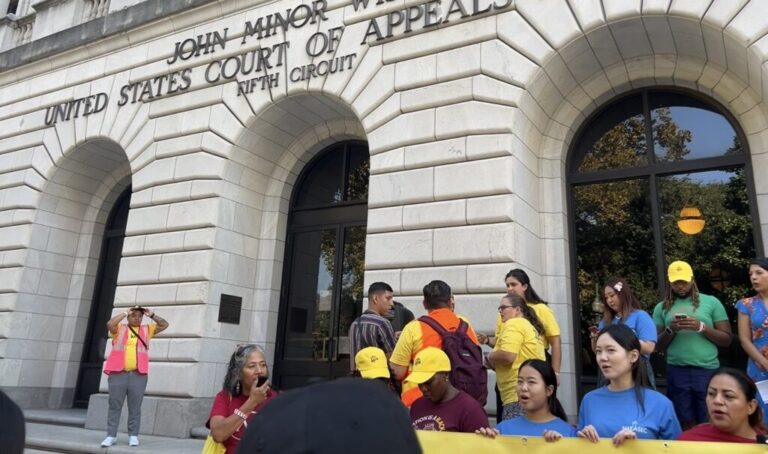The American Immigration Council does not endorse or oppose candidates for elected office. We aim to provide an analysis of the election’s impact on the U.S. immigration system.
Written by Paralegal Ilse Ramirez and Digital Communication Specialist Andrea Rathbone Ramos
On October 10, the Fifth Circuit Court of Appeals in New Orleans, Louisiana, heard oral arguments regarding the Deferred Action for Childhood Arrivals (DACA) initiative. The court is deciding whether DACA is illegal, potentially paving the way for a new fight at the Supreme Court.
Meanwhile, this decision will impact the lives of more than 500,000 undocumented youth brought to the United States as children, including myself.
Currently, DACA recipients are allowed to renew their status every two years. U.S. Citizenship and Immigration Services accepts initial applications and application fees, but cannot process or approve new applications.
As a DACA recipient who can renew every two years, I can’t help but think of the many people who are holding off on applying for the first time. DACA is a double-edged sword. It opened many doors for me, allowing me to pursue higher education, apply for a driver’s license, and obtain legal employment. But it’s also a constant reminder that there is no path to citizenship for people like me, and that temporary protection from deportation can be revoked at any time.
The initiative was launched under the Obama administration in 2012 to rescue many undocumented immigrants brought to the United States as children. Since then, DACA has faced numerous legal challenges. Most recently, in 2023, U.S. District Judge Hanen ruled that the program was illegal. While this ruling allowed current recipients to renew their eligibility, it also blocked the approval of their initial applications, leaving hundreds of thousands of people insecure, including those I care about very much. I was left in a state of fear.
Ending the DACA program will have a significant impact on the national economy. Our latest Map the Impact data shows that DACA-eligible individuals contribute billions of dollars to the U.S. economy. More than 96% of DACA-eligible people are currently employed. The employment authorization provided by DACA allows recipients to pursue higher education and better employment opportunities, increasing their income and economic contribution to their communities. As their incomes increase, so do their tax payments, positively impacting local, state, and federal economies. Furthermore, data shows that DACA recipients are highly entrepreneurial. Approximately 73,000 people have started businesses, creating job opportunities for Americans and driving economic growth.
It doesn’t end there. DACA recipients are essential to our economy, and we are not alone in knowing that ending DACA would have dire consequences. For example, the Cato Institute estimates that deporting DACA recipients would cost $60 billion and result in $280 billion in economic losses over the next 10 years.
Beyond the financial costs, deporting DACA recipients could negatively impact local businesses, schools, and economies that rely on their donations. From educators to entrepreneurs, their absence will leave a huge gap in communities across the country.
And on a personal level, families like mine across the country will be devastated.
You know, this is not just about DACA. It’s about keeping the family together. More than 250,000 U.S. citizen children have a parent who is a DACA recipient, and 1.5 million live in mixed-status families. Losing DACA can lead to heartbreaking separations, leaving orphaned children, cross-border spouses, and elderly family members without support. The emotional burden of forced separation is immense, impacting not only the families involved but the entire community.
Additionally, there is a deep-seated psychological fear of not knowing if your family is safe. As someone who has lived in this reality, I know that the fear of separation is ever-present. It pains me to think that more children will experience anxiety and trauma throughout their lives. That’s why Congress needs to act.
The schedule for the Fifth Circuit’s decision is unclear. They could rule against DACA again, effectively ending the program that helps many illegal aliens.
DACA recipients need permanent protection, not a temporary solution. It’s time for Congress to pass legislation that provides a path to citizenship for undocumented youth and ends constant uncertainty. No matter what happens on October 10th, future decisions can change the future for thousands of families. Waiting for the unknown is irresponsible. True security can only be achieved through lasting reform.
Fill in below: 5th Circuit


